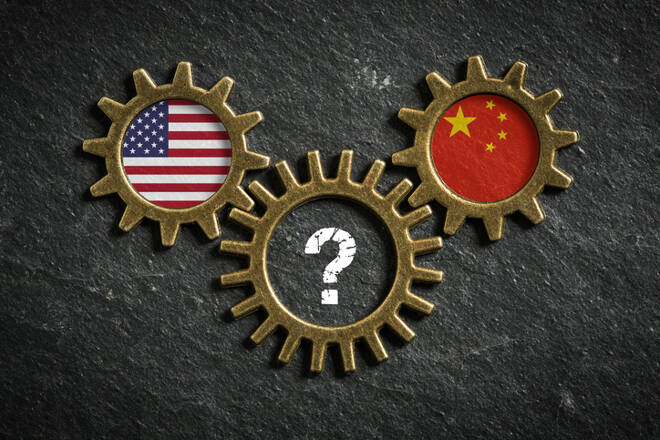Advertisement
Advertisement
Trade Dispute Worries Persist as Wall Street Prepares for Bigger Hit on Global Economy
By:
On Thursday, a number of firms released news reports warning the trade war was getting worse including economists and strategists from Nomura, Goldman Sachs and Bank of America.
The major Asia Pacific stock indexes were mostly lower on Friday, reflecting the weakness seen on Wall Street earlier in the session. The catalysts driving the selling pressure are worries that the escalation of the trade dispute between the United States and China is causing global economic weakness. A rebound in crude oil prices is helping to soften the downside pressure.
In the cash market, Japan’s Nikkei 225 Index is trading 21050.75, down 100.21 or -0.47 percent. Hong Kong’s Hang Seng Index is at 27323.09, up 55.96 or +0.21 and South Korea’s KOSPI Index is 2040.88, down 18.71 or -0.91 percent.
In Australia, the S&P/ASX 200 Index is trading 6442.10, down 49.70 or -0.77 percent. In China, the Shanghai Index is at 2851.40, down 1.11 or -0.04 percent.
Is Wall Street Convinced of Worsening Prolonged Trade War?
On Thursday, a number of firms released news reports warning the trade war was getting worse including economists and strategists from Nomura, Goldman Sachs and Bank of America.
Nomura
Lewis Alexander, Nomura’s chief U.S. economist said, “We now think it is more likely than not that the Trump Administration will move ahead with the final tranche of tariffs targeting roughly $300bn in imports from China at a 25% rate. Our baseline scenario assumes that the new tariffs go into effect at some point before end-2019, most likely in Q3 after a meeting between Presidents Trump and Xi at the G-20 in late June.”
“Without a clear way forward during an intensifying 2020 US presidential election, we see a rising risk that tariffs will remain in effect through end -2020,” Alexander added.
Goldman Sachs
At Goldman Sachs, economists are still hoping for a trade deal, but preparing for the worst to hit the U.S. and Chinese economies along with rising inflation.
“While we still think an agreement is more likely than not, it has become a close call and without additional signs of progress over the next few weeks, implementation of the next round of tariffs on $300 billion of imports from China could easily become the base case,” wrote Goldman economists.
“Our model says that an across-the-board 25% tariff on China with a limited amount of retaliation would hit US GDP by 0.5% and Chinese GDP by 0.8%, all over a three-year period,” the economists wrote.
Bank of America
Bank of America fixed income strategists, in a note, said the trade war is turning out to be worse than they expected. They sliced their forecast for the 10-year Treasury yield to 2.6% at year-end, from a previous 3% based on trade war impacts and the easier policy of global central bankers, who are responding to slower growth, low inflation and concerns about financial conditions.
“Following the latest tariff developments, our year ahead numbers imply a best case scenario for a resolution of the US-China trade dispute, which seems unrealistic. We cut our forecasts,” the Bank of America strategists wrote.
About the Author
James Hyerczykauthor
James Hyerczyk is a U.S. based seasoned technical analyst and educator with over 40 years of experience in market analysis and trading, specializing in chart patterns and price movement. He is the author of two books on technical analysis and has a background in both futures and stock markets.
Advertisement
